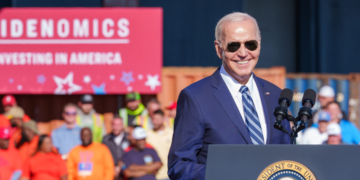Nearly 350,000 Americans settled for part-time jobs in July according to Bureau of Labor Statistics (BLS) data released Friday.
The U.S. unemployment rate rose .2% to reach a near three-year high of 4.3% in July, with just 114,000 nonfarm payroll jobs being added, well below the 179,000 jobs added in June, according to the BLS. Meanwhile, the number of American workers employed part-time because their hours were reduced or they could not find full-time jobs increased by 346,000 to 4.6 million, raising the specter of recession, according to economists who spoke to the Daily Caller News Foundation.
“Employers have been shedding full-time jobs because of lackluster demand and increased uncertainty. This is a very common behavior by firms as the economy heads into recession,” E.J. Antoni, a research fellow at the Heritage Foundation’s Grover M. Hermann Center for the Federal Budget, told the DCNF. “The Biden-Harris administration has turned the American labor market into a temp agency.”
All of the net job gains since Jun ’23 have been part-time employment; while the economy hemorrhaged 1.1 million full-time jobs, part-time jobs rose 5.6%, b/c it’s nothing more than a gig recovery at this point: pic.twitter.com/I93rtpVL6w
— E.J. Antoni, Ph.D. (@RealEJAntoni) August 2, 2024
Since June 2023, the U.S. has netted a loss of roughly 1.1 million full-time jobs, meaning all of the approximately 2.7 million jobs added over the past 13 months have been part-time, according to the the Federal Reserve Bank of St. Louis (FRED).
“I think this job’s report is showing us the toll of high inflation, the toll of interest rates that remain elevated to combat the inflation and the fact that consumers are largely tapped out as a result, as demonstrated by dramatically increased credit card debt,” Aaron Hedlund, director of research at the America First Policy Institute, told the DCNF.
Inflation sat at 3.0% year-over-year in June, well above the Federal Reserve’s 2% target, while prices have risen more than 20% since President Joe Biden took office in January 2021.
Average nominal hourly earnings for private nonfarm employees increased by 0.2% to $35.07 in July, an increase of 3.6% from a year prior, according to BLS data.
To combat elevated inflation, the Federal Open Market Committee (FOMC) kept the federal funds rate target range between 5.25% and 5.5% at its meeting Wednesday, marking the eighth meeting in a row where the FOMC has chosen not to adjust the rate.
High interest rates increase the cost of borrowing for consumers and businesses alike. Credit card delinquency rates reached their highest level since 2012 in the first quarter of 2024, with 2.59% of credit card balances more than 60 days overdue and total revolving balances hitting a record $628.6 billion.
Meanwhile, elevated inflation and interest rates have exhibited downward pressure on Americans’ bank accounts, with the personal savings rate falling to 3.4% in June, far from its peak of 32% during the COVID-19 pandemic, according to FRED.
The healthcare and government industries accounted for just over 63% of jobs added in July, with 55,000 and 17,000 jobs added respectively. In 2022, government sources accounted for just over 45% of healthcare spending, according to the Congressional Research Service.
On July 5th, the White House issued a press release claiming the Biden administration created a record 15.7 million jobs since entering office.
“Just like the incredible lie that inflation was ‘over 9%’ when Biden took office, the employment accomplishments they are attempting to take credit for are absurd as well,” Peter C. Earle, senior economist at the American Institute for Economic Research, told the DCNF.
The White House did not immediately respond to a request for comment.
Featured image credit: (Official White House Photo by Cameron Smith)
All content created by the Daily Caller News Foundation, an independent and nonpartisan newswire service, is available without charge to any legitimate news publisher that can provide a large audience. All republished articles must include our logo, our reporter’s byline and their DCNF affiliation. For any questions about our guidelines or partnering with us, please contact [email protected].



























 Continue with Google
Continue with Google